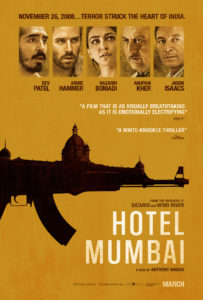Hotel Mumbai
Posted on March 21, 2019 at 5:43 pm
B| Lowest Recommended Age: | Mature High Schooler |
| MPAA Rating: | Not rated |
| Profanity: | Some strong language |
| Alcohol/ Drugs: | Alcohol |
| Violence/ Scariness: | Extended, intense terrorism violence with many characters injured and killed, disturbing and graphic images |
| Diversity Issues: | A theme of the movie |
| Date Released to Theaters: | March 22, 2019 |
| Date Released to DVD: | June 17, 2019 |

“Look for the helpers.” That’s what Mr. Rogers told children to do when scary and terrible things happen. “You will always find people who are helping.” “Hotel Mumbai” is the story of the unspeakably sad and scary 2008 terrorist attack that lasted for four days in Mumbai, India, including a three-day attack at the luxurious Taj Palace and Tower hotel.
Inspired by the documentary “Surviving Mumbai,” director/co-screenwriter Anthony Maras did extensive research, including interviews with many of the survivors, to tell the story of the sacrifice, courage, and resilience of the helpers.
The Taj is a legendary hotel, “home to statesmen and celebrities for over a century.” It was opened by a wealthy Indian who was not allowed to stay in one of the British-run hotels. It operates at the highest level of service. We see the preparations for the arrival of a wealthy middle-Eastern woman named Zhara (Nazanin Boniadi) who is coming with her new American husband, David (Armie Hammer), their baby, and the nanny (Tilda Cobham-Hervey as Sally). Her rose-petal scented bath is heated to precisely 48 degrees celsius, just as she likes it. And he cautions the staff not to congratulate her on her wedding as it is a sensitive subject, since she was pregnant at the ceremony and her family does not approve. The slogan of the staff is “Guest is God.” Everything they do is for the comfort and enjoyment of the guests.
We see a staff member named Arjun (Dev Patel) adjust his Sikh turban precisely with a pin to make sure that each fold is perfectly aligned before leaving home. But when he gets to the hotel and puts on his impeccable uniform, he realizes that he does not have his shoes. Inspecting the staff before, chief chef Oberoi (Indian cinema star Anupam Kher) tells Arjun he is dismissed. He cannot appear before the guests in sandals, “looking like a beggar.” But then Oberoi relents, and tells Arjun he can wear Oberoi’s own shoes, which Arjun does, even though they are much too small.
Meanwhile, a group of terrorists from an extremist Islamic cult in Pakistan are arriving by boat, listening to a voice on their phones (all taken from real-life recordings from that day), telling them “You are calm…you are all like sons to me…I am with you…paradise awaits you.” Their backpacks are filled with guns and grenades, and their plan is to create chaos and terror at 12 different locations through Mumbai, which, as we will learn, has no special forces with the training or equipment to stop terrorist attacks.
Over the course of the film, three different characters make reassuring and completely dishonest phone calls to parents, telling them that despite what they see on television, everything is fine and they are safe. In another scene, a terrified hotel guest confronts another guest who has been speaking Farsi and says she is afraid of a staff member wearing a Sikh turban. The Sikh talks quietly to her, telling her that the turban is a symbol of honor, but he will remove it if it makes her more comfortable. He shows her a photograph of his family, reminding her of what all humans share, so she tells him to keep it on.
Everything terrible that happens in the film is caused by thinking of some people as “other.” The terrorists are led by a voice who constantly separates them from the rest of humanity. One of them kills a woman when told to by the voice in his ear, but when the voice tells him to reach into the dead woman’s bra to find her ID, he cannot. The voice says she was an infidel, so it doesn’t matter. But his faith is so essential to his identity that touching a woman’s breast is more forbidden than killing her. Throughout the story, as unthinkably horrific violence occurs, family keeps coming to the forefront as the essential connecting force.
Maras has a remarkable gift for a first-time director for giving us a sense of place. In the midst of chaos, we have a good idea of the various locations in the hotel and how they relate to each other. There is an action movie version of this movie where someone like Bruce Willis comes in and “Die Hards” it, but Maras keeps it soberingly, terrifyingly real, in part through tiny moments like the terrorists’ first look at a flush toilet (when they go into a bathroom to shoot an old lady), and when a hostage’s prayer shifts a shooter’s focus so that he is no longer able to make her an other, a moment of human connection that no amount of propaganda can cancel out. Maras wants us to see the helpers. But he wants this movie to help us be helpers ourselves.
Parents should know that this film includes horrific terrorism violence, though much of it is off-screen and not exploitively portrayed. Many characters are injured and killed and there are disturbing images. The film also includes some strong and bigoted language, alcohol, and sexual references and insults.
Family discussion: What do we learn from the three phone calls characters in the movie make to parents? How did the characters determine what their loyalties were?
If you like this, try: “United 93” and the documentary “Surviving Mumbai”
